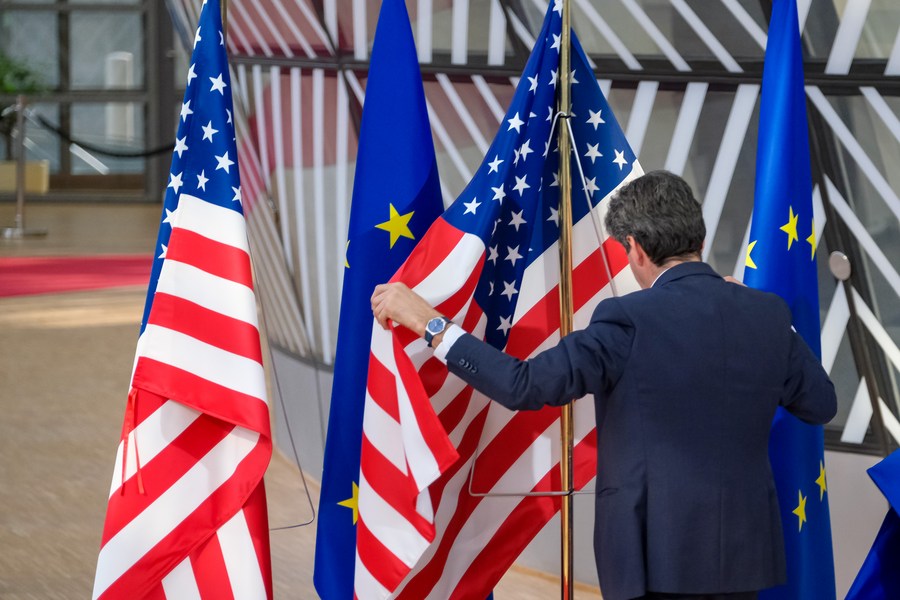
A staff member hangs a US national flag before US President Joe Biden arrives for the European Council meeting in Brussels, Belgium, March 24, 2022. [Photo/Xinhua]
This is an editorial from China Daily.
Since it is the United States that has defined China as a "threat" to Europe, the European Union now finds itself in a dilemma, as some of its members are more receptive of that view than others.
After the US launched its campaign to suppress the development of China's high-tech industry in 2018, with its actions targeting Huawei, it coerced its European allies to tag along, albeit many have done so with no great enthusiasm.
Now with Washington having broadened and intensified its efforts to impede China's development, it is no longer just Europe's 5G networks that Washington is intent on hijacking for its cause. It wants to dictate the EU's economic and trade policies. That has the EU uncomfortably caught on the proverbial horns as its two key institutions have different views on the merits of the US allegation.
As a Politico article published on Monday said, the EU's top ranks are split over China. Ursula von der Leyen, head of the EU's executive commission, has a cozy relationship with the Joe Biden administration and is toeing Washington's hard line on China, while Charles Michel, chief of the bloc's council, wants to maintain cooperative relations with China.
The upshot of that, as the Politico piece observes, is "a potential clash is looming" over the EU's China policy, with the council arguing that the commission should consult national governments more before rushing to do Washington's bidding.
The tensions between the council and the commission over the EU's China policy have come to a head over the timing of the next EU-China Summit, with the commission insisting that the next summit with China, which had been penciled in for June, cannot take place before the next summit with the US. However, Washington has indicated that Biden won't attend a summit in Europe before June — which would push the EU-China summit into the second half of the year.
There is a lot at stake for the EU. The split between "the EU's dueling powerhouses" is not only about the bloc's immediate economic interests, but also about its autonomy. The outcome of the tussle between the council and the commission will decide whether its economic and foreign policy is decided in Brussels or in Washington.
Although it seems to be a choice between being "pro-US" and "pro-China", it is in reality a choice between the EU having freedom of action and it being a geopolitical tool of the US.
In making that choice, the European countries should bear in mind that it is the US that is hurting European interests more than any other party. Washington's total disregard for European interests is evident in its Inflation Reduction Act. They should also reflect on the fact that it is the long-gestating machinations of Washington that have resulted in the largest and most damaging conflict in Europe since World War II. It is not their dependency on China that European countries should worry about, but their dependency on the US.

 中文
中文



